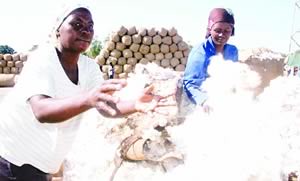
Zimbabwe cotton farmers earned from this year's yield according to a recent article in the state newspaper The Herald. The land redistribution program in this Southern African state has provided farms to people dispossessed by colonialism., a photo by Pan-African News Wire File Photos on Flickr.
The burden of colonialism
Friday, 23 November 2012 00:00
Keith Guzah
The literature on the African state is suffused with adjectives and epithets describing the post-colonial state, Zimbabwe included. Such terms include quasi-state, weak state, failed state, collapsed state, soft state, kleptocratic state, swollen state, shadow state, fictive state, garrison state, neo-patrimonial state, banana republic and many others.
These caricatures are partly influenced by some economic and political disparities that were created by the process of colonialism and subjugation. The colonial systems were characterised by the exclusion of the indigenous people from the centres of power and mainstream economy.
This created a caste system which generally viewed or classified the indigenous people as inferior and second rate beings. The caste system evolved from the way in which colonial administration organised society in order to safeguard and perpetuate their privileges and interests.
Poverty, hunger and disease remain widespread in Africa and women and girls constitute the majority of the world’s poorest people. According to Thomas since the 1980s and 1990s, the world wide promotion of neo-liberal economic policies (The Washington Consensus) by the so called global governance institutions, has been accompanied by increasing inequalities between and within states.
Yet despite these obvious shortfalls of the Western model of free market economics, it has been implemented religiously for decades since World War II and peaked in the late 1980s and early 1990s with the fall of the Soviet Union and the attempt at global empire by the United States in the unipolar era.
Up until the early and mid-1990s, the beneficiaries of the colonial economies were a minority group made up of carefully nurtured feudal oligarchy and their pampered, indolent and unproductive scions.
In Zimbabwe for example, the asymmetrical distribution of land and natural resources that was skewed in favour of the minority white colonial masters gave rise to persistent feelings of fundamental injustices, leading to frustration, resistance and violence.
Van Der Ven, Dreyer and Pieterse argues that “structural violence, which was there during the colonial period, persists in a society which, notwithstanding political transformation, still suffers under intractable systems of economic, social and cultural inequality and injustice.”
In Zimbabwe, Affirmative Action and Black Economic Empowerment lobby groups came into being after realising structural inequalities in the areas of finance, employment, housing, sanitation, health, food and income. According to Kanyenze, Kondo, Chitambara and Martens, “Zimbabwe’s large scale agriculture was an enclave which was developed on the basis of ruthless land dispossession for a period of over 90 years after 1890.
On the other hand, many of the black African population were condemned to below subsistence farming in neglected, marginal and largely overcrowded “Tribal Trust Lands” which could not provide a descent livelihood, forcing many into low wage employment and migration.”
Nevertheless, agricultural activities such as crop production, food processing and animal husbandry had been core means of subsistence for the people of Zimbabwe before colonisation, to the extent that commercial farming by the white settlers benefited immensely from the basic farming skills and a culture of hard work that the population possessed prior to being forced into wage employment on white owned farms.
The majority’s need for land, coupled with their undoubted capability to use land to produce surplus for the market, compelled the Rhodesian government to introduce small scale farms for black farmers, particularly for those to whom they awarded Master Farmer Certificates. The small-scale farms for blacks established before independence included areas such as Chitomborwizi, Zowa,
Mushagashe, Masema, Gandani and Travellers Rest, just to mention a few.
According to Chiyangwa, “Redressing past imbalances, through positively discriminating policies and practices — which is our uncomplicated definition of Affirmative Action — gives the black majority, the natives, and the indigenous citizens the national beneficiary position”. Chiyangwa further argues that meaningful Affirmative Action policies and programs must explicitly, categorically and unambiguously be based on race.
It is a truism from the above assertions that the decolonisation of Africa, the spring of independence ceremonies which followed the “Winds of Change” that swept across the continent in the fifties, sixties and seventies conferred upon the African majority ownership and control of African affairs, to the extent that any justification for redressive action of the Affirmative Action type would only relate to minorities and exceptional cases.
Affirmative action insists on the fundamental fact that the indigenes people must be able to lay strong claim to the levers of government. Chiyangwa postulates that “we should never succumb to the psychological terror often unleashed upon us by name callers and opinion manipulators. Thus, access to the centres of political power is the First Degree of Freedom necessary for a successful Affirmative Action/Indigenisation program.
Dr Guzah is the president of Affirmative Action Group.
No comments:
Post a Comment